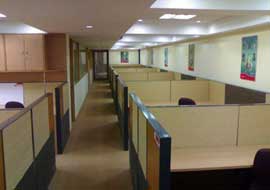
Sources of Indoor Air Pollution / Pollutants in Hospitals
HVAC Systems in an office building account for upto 60% of electricity consumption.
Major cost borne by the Corporate World.
Volatile Organic Compound (VOC)
In Indoor Environment Toxic Gases are emitted from wide variety of sources:
• Building Materials, • Cleaners, Plastics, • Wood Products,
• Paints, Carpets, • Polishers, • Deodorants, etc.
Volatile Organic Compound (VOC)
It adversely affect to:
Allergy, Asthma, Eye & Nasal irritation, Affect respiratory tracts, etc.
Carbon - di - oxide - Co2
In an indoor environment human being Exhale Carbon dioxide it cannot be reduced or oxidized.
It is not a toxic or carcinogen but a high level of CO2, causes:
• Headaches, Restlessness,
• Difficulty Breathing, Sweating,
• Tiredness, Increased Heart Rate,
• Elevated Blood Pressure, etc
Odor
Odour is a major Irritants & it is cause from various sources:
• Food Odour
• Body Odour
• Mold, Fungi & Microbes
• Cleaning Chemical Odour, etc
This is a residual odor & difficult to dilute from conventional method.
These are collectively known as "SICK BUILDING SYNDROME"
To address Sick Building Syndrome (SBS) the AHU systems take "Outdoor Air" to dilute Volatile Organic Compound (VOC) and reduce Carbon dioxide (CO2) within acceptable limits.
Conventionally Fresh Air is used to improve Indoor Air Quality (IAQ)
• Fresh air is not cheap!
• Hot and humid air needs to be cooled down to room temperature.
Hidden Cost of Fresh Air taken by Air Handling Unit in an HVAC System:
Load profile of fresh air
• 60% to cool moisture . wasted energy
• 28% to cool nitrogen ...wasted energy
• 12% to cool oxygen ...the only useful component in fresh air.
"Energy Consumption- 150 CFM of Fresh Air will require 1ton of cooling load. (Approximately)"
Position of ASHRAE on reducing fresh air intake:
"ASHRAE approves reduction in fresh air, if chemical contaminants in air are removed".
We refer you to the following sections of ASHRAE62-99:
"Procedure for use of cleaned recirculated air: The amount of outdoor air may be reduced by recirculating air from which offending contaminants have been removed or converted to less objectionable forms. Formaldehyde, for example may be oxidized to water and carbon dioxide. The amount of outdoor air depends on the contaminants generated in the space, etc ......".
ASHRAE Standards
• ASHRAE Ventilation code no. 62-1999.
• Minimum 15 CFM per person fresh air is required.
• Minimum of 30 CFM fresh air is required if smoking is permitted.
Chemtronics' Solutions to minimize "Fresh Air Intake"
How to reduce "Fresh Air"
• By using controlled injection of ozone.
• Oxidation of Volatile Organic Compound (VOC) is performed by ozone and not by oxygen of the fresh air.
• Ozone is more powerful oxidizing agent than oxygen.
• In the presence of a more powerful oxidant, less powerful oxidant does not have the chance to perform oxidation, until no more of the former is available.
• Oxygen of the fresh air is preserved and not spent in performing the task of oxidizing the Volatile Organic Compound (VOC), which is now transferred to ozone.
• Available oxygen is now used entirely to maintain Carbon-di-oxide.
• Intake of fresh air is reduced drastically. Thus fresh air requirement goes down to 5CFM or less per person.
Ozone Generator is used for VOC reduction, Ozone is used as Air Purifiers in Hospitals; Air Treatment is done using Ozone in Healthcare:
Ozone is increasingly being used in HVAC systems to improve the indoor air quality & also to achieve the energy efficiency of the Hospital HVAC systems. Chemtronics has successfully designed and installed oxygen fed air Ozone Generator to integrate with the present Hospital HVAC system.
It achieves acceptable Indoor Air Quality (IAQ) while minimizing energy consumption, and fully complying with ASHRAE standards. It also helps in getting LEED rating points on Indoor Air Quality. Use of Ozone Generator in Hospital HVAC Systems will helps in improving Indoor Air Quality, Energy Efficiency. This unique technology integration gives buy back of CapEx in less than 2 year.

Head Office: 28, Satyam Industrial Estate, Subhash Road, Jogeshwari (East), Mumbai, Maharashtra 400060